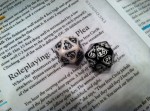Written: JANUARY 2012, & formerly hosted at obsidianadventures.com
Note: Bracketed words previously accompanied D&D art that was included with the original blog.
A few days ago, Monte Cook posted two short paragraphs and a poll to his page on the Wizards of the Coast community. Those few words stirred up a lot of conversation about race in Dungeons & Dragons in the comments and on Twitter over the weekend. For me (Draco), it brings up a long standing pet-peeve about how D&D conflates race and culture. I’ve talked about this with my co-author (Aaron)* before, and we decided that with the attention its getting now, it warranted a more public and in-depth look.
The Issue At Hand
The basic “problem” is this: When you pick a race in D&D, you’re also getting a pre-packaged culture with that choice. This happens because all races in D&D that are not human have a single monoculture that is assumed to be true and consistent across both space and time. You can see the effect of this assumption in “racial” mechanics. All elves, everywhere, know something about nature. All dwarves, ever, will know how to wield a warhammer or an axe. Those are not really things that are affected by being born a elf or a dwarf; they are the results of the elf and dwarf monocultures. Now, if you want to play a dwarf with a hammer, that’s fine. You are rewarded with those benefits for playing to the stereotype.
[A dwarf with a sword! Heresy!]
If, however, you want to play a dwarf who likes swords, or an elf who has never even set foot in a forest, you are either penalized by not playing to the strengths of the “race”, or have to rely on houserules and bend the system to make it work. Never mind that it doesn’t even make logical sense to assume that every elf is handed a bow as soon as they’re old enough to learn how to use it. The monoculture system also smacks a bit of ethnocentrism. Humans are varied and have many different cultures. Every member of every other race fits into a singular mold.
This can almost certainly be traced, at least in part, back to Tolkien. But even in Middle Earth, not every dwarf is the same. Just read the Hobbit. So why, in this modern era, are we still allowing our fantasy to fall into these easy tropes? Is it lazy design, complacent players, or something of both? Especially in cosmopolitan worlds like Eberron and the Forgotten Realms, it makes less sense to stick religiously to these hide-bound traditions.
Now, some mechanics do make sense as “racial”, inherited traits (which, for the purpose of this article we’re going to define as something “inborn”, “genetic” and stemming from nature, as opposed to nurture). Sometimes it appears that ability modifiers certainly have more to do with race than culture. (Though even that is problematic, which we’ll get to in a bit.) We won’t get into genetics and dominant vs. recessive traits, here. There’s room for some broad strokes, I think. It is still a game.
A Possible Solution
This can all be fairly easily solved by breaking Race and Culture apart. Make these things modular. Allow players to pick a race and then apply relevant bits of culture. Your elf is from the city of Greyhawk? Maybe she’s skilled in Streetwise instead of Nature. Maybe she never learned to use a bow in the city (not terribly functional in an urban environment) but picked up some other talent instead. But, she was born an elf so she has the racial elven inborn Low-Light vision and is naturally agile (DEX bonus). The idea isn’t to make every race the same so that there’s functionally no difference from playing a dwarf to playing a human. It makes sense to distinguish them in some ways. A dwarf certainly isn’t a human, and an elf isn’t a halfling.
However, a dwarf raised in a human village is absolutely going to have more in common with his human neighbors than any of his distant relatives in ye-olde-dwarven-mountain-holdfast. This is enculturation at work. He’ll still be a dwarf, but he’ll have been raised among a predominantly human culture. Maybe his parents insisted that he learn the ancient dwarf heritage of hammer swinging, but he picked up some of the humans’ love of History instead of learning about Dungeoneering.
These are just examples. Maybe D&D Next will handle these sort of traits differently, but the general idea can still apply. Let players make these choices about their PC without having to go to the DM and ask for special permission to make an exception to the rules. This also gives the DM better tools when she’s world building to create a distinct setting that can vary in more interesting ways from other worlds.
[These two certainly don’t fit the usual mold for their respective races.]
Which brings us to another point: that this allows different published settings to more easily distinguish themselves. We might be able to rationalize why a dwarf from two far-flung parts of the same world are exactly the same (mechanically), but why is a dwarf from Oerth the same as a dwarf from Toril? Or a dwarf from Athas? Or, at least, why do they HAVE to be the same, according to the rules as written? It allows a DM to more easily challenge a players perception of what things are. No longer is a dwarf just a bundle of stereotypical traits. A dwarf is an individual that happens to be a dwarf.
This could also let us move past (or at least around) the idea of subraces in D&D. The concept of “race” as it was once understood doesn’t apply anymore, at least in the real world. At best, the concept is controversial. It may make sense to say that an elf and a human are of different races, but why must we subscribe to the idea that differences in culture (or skin color) = a different race? This is an outmoded concept in our world. Let’s move past it in our stories, too.
Another use for this solution could be for handling half-breeds. No longer would a half-elf need to be a stand-alone unique race. In fact, half-elves all being the same is perhaps the best (or worst) example of the nonsense of monoculture. With a modular system, you could just pick two races and apply benefits as desired. Maybe your half-elf isn’t diplomatic at all. Maybe she was raised among elves and learned to use bows. Perhaps she isn’t at all charismatic, but inherited some physical strength from her human parent. Build your own half-elf, half-dwarf, or half-halfling. Why not?
Speaking of Charisma, this is probably as good a place as any to point out the trouble with ability bonuses. Are all dwarves really born extra wise? Do eladrin have better brains than other races? Isn’t it a bit offputting or uncomfortable to imply that some races are naturally more intelligent (or less intelligent) than others? The Essentials rules made a good step forward by allowing players to choose between a couple different ability modifiers for each race. And it makes sense to limit races in some ways. An elf’s physical build likely doesn’t allow for as much muscle mass as a dwarf or dragonborn might have, for example. But allowing more variety always makes things more interesting.
And that’s really what this is all about. If you want to play the stereotypical gruff, hardy, mountain-dwelling dwarf, that’s perfectly alright. We’re not here to tell you that’s badwrongfun and that you can’t do it anymore. Any time you have fun with something, you’re doing it right. The idea is, as stated above, to give DMs and players the tools to more easily build beyond those stereotypes if they want to do so.
Potential Problems with the Solution
If we make other races more customizable, what’s going to be left to make humans distinctive? Why would you want to play a boring old human if every race is just as flexible and changable? Good questions! We note that D&D’s default is to say that humans are the most adaptable and diverse race and we see no reason to change that. We’re not saying that it’s critical to allow elves to be as versatile as humans. Just break them out of their current mold a bit. Humans can still have the most options available and that doesn’t have to be diminished just because other races have more options than they previously did.
But won’t the min-maxers go to town and abuse this? Well, yeah, probably. That’s what min-maxers and power gamers do. Even the most innocuous option can sometimes be twisted to help create an unstoppable monster of a PC. As always, its primarily the DM’s job to decide whether they want to allow things in their game and to watch out for abuses of the system. Instead of culling the available options to prevent rules abuses, it’s better to include something in the books to give the DM a heads up on how to recognise such exploitative behavior and handle it if it crops up.
[Embrace your inner halfling barbarian.]
Aren’t players already flooded with options? An increase of options can certainly overwhelm newer players. Even more experienced players might be daunted at the additional complexity of determining what bonuses and benefits they receive for a particular environment, upbringing, or culture. Prepackaged options in addition to a more freeform listing of available choices can help take the sting out of this problem to some extent, but it is still something which DMs might have to be on the look out for.
We think that any potential problems or complications are more than outweighed by the benefits that breaking culture from race gains you and your campaign. A player gets to make exactly the sort of character that they’d like without feeling that they are being mechanically punished for thinking outside the box or approaching the game in a creative way.
In summary, race is not inextricably tied to culture and variety is the spice of the gods. Even if it never comes to fruition in an official D&D product, making an effort to treat race and culture as separate in your home game can produce an experience unlike any other. Leave your players talking fondly about their time helping out the sea-faring dwarves or beating back the raids of the militaristic and bloodthirsty halfling kingdoms!
*Aaron can also be found at @WolfSamurai on Twitter.











